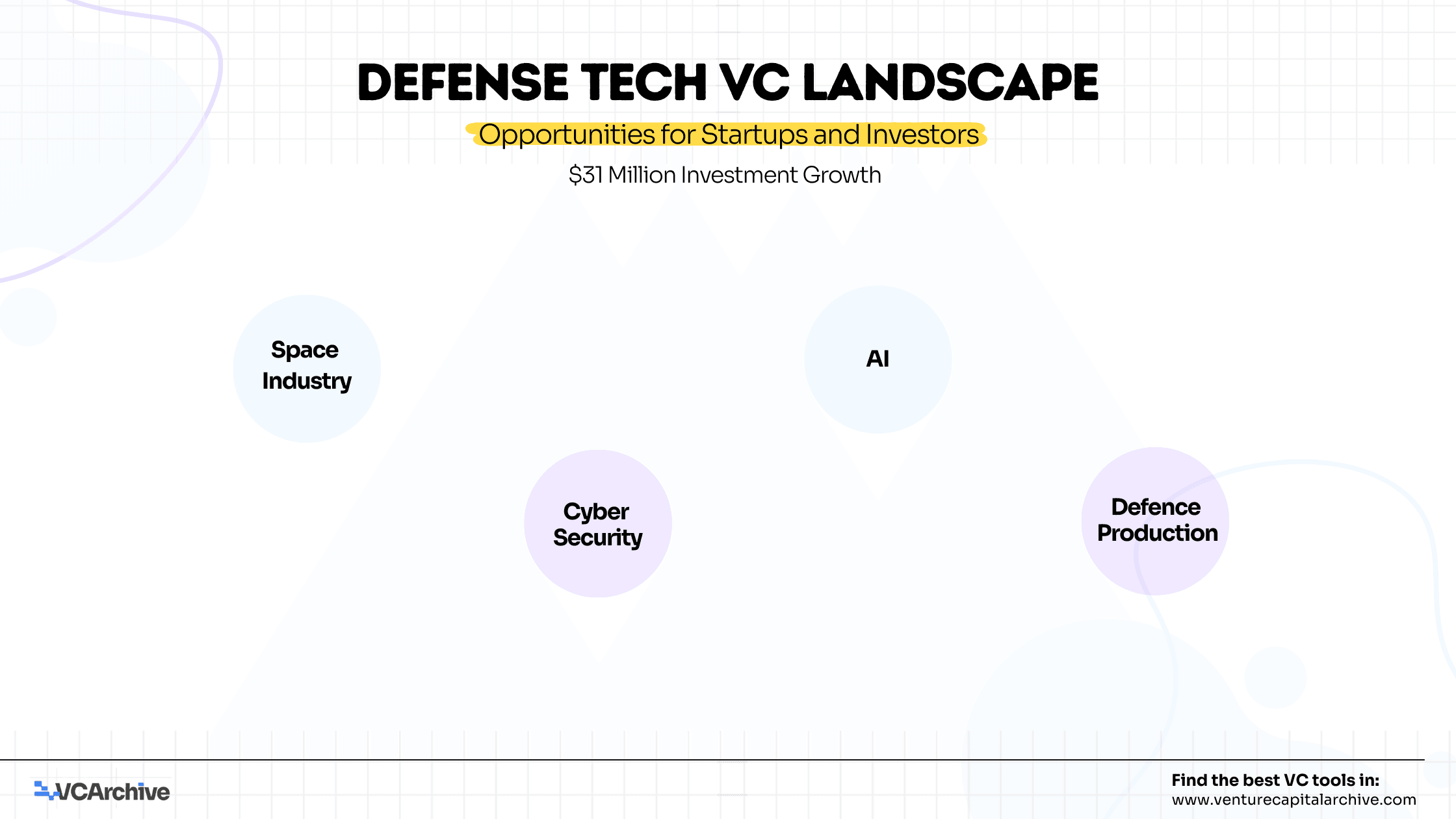
Defense Tech VC Landscape: Opportunities for Startups and Investors

Why Defense Tech Now?
Several factors are driving this investment boom:
- Success Stories: Companies like Anduril, Palantir, Scale AI, and Shield AI have proven that startups can successfully break into the defense sector and secure major government contracts.
- National Security Imperatives: As global tensions rise, there's growing recognition that technological superiority is essential for maintaining military advantages.
- Technological Convergence: AI, robotics, space tech, and other emerging fields are creating new opportunities at the intersection of commercial and defense applications.
- Government Support: The Department of Defense has made significant efforts to streamline procurement processes and engage with innovative startups.
Key Players in the Defense Tech VC Ecosystem
The defense tech investment landscape features a diverse mix of players:
Traditional VCs Moving into Defense
Firms like Andreessen Horowitz, Lux Capital, and Lightspeed have established dedicated defense tech practices:
- Katherine Boyle at Andreessen Horowitz leads their American Dynamism practice, having previously backed Anduril at General Catalyst.
- Josh Wolfe at Lux Capital has invested in companies like Anduril, Saildrone, and Hadrian.
- Connor Love, a former US Army captain, leads defense investments at Lightspeed.
Specialized Defense Tech Funds
Some VCs focus exclusively on defense and national security:
- Harpoon Ventures, founded by former Olympic swimmer and Navy SEAL Larsen Jensen, manages $300 million in AUM focused on enterprise tech "critical to national security and democracy."
- Shield Capital, with partners like Raj Shah (former F-16 fighter pilot) and Michael Brown (former head of the Defense Innovation Unit), backs companies at the intersection of commercial and defense tech.
- Marque Ventures, led by Jake Chapman, specifically targets defense and national security startups.
Corporate VCs from Defense Primes
Defense giants are also getting in on the action:
- RTX Ventures, led by Daniel Ateya, has invested in aerospace and defense startups like Ursa Major and Hermeus.
- Lockheed Martin Ventures doubled its fund size to $400 million in 2022 to accelerate "defense innovation through investments in growing tech companies."
Government-Adjacent Investors
Some investors bridge the gap between government and startups:
- In-Q-Tel, the CIA's venture capital fund led by Steve Bowsher, has been instrumental in creating the defense tech ecosystem, with early bets on companies like Palantir and Databricks.
- US Innovative Technology Fund, led by Thomas Tull and Peter Tague, focuses on companies serving both defense and commercial sectors.
What VCs Look For in Defense Tech Startups
Defense tech investors evaluate founders and companies differently than traditional VCs:
- Mission-Oriented Founders: "Defense investing is the ultimate form of mission investing," says Josh Manchester of Champion Hill Capital. Investors look for founders committed to national security challenges.
- Long-Term Commitment: Alex Moore of 8VC seeks founders willing to work on their ideas for decades: "Is this guy going to work on this when he's 25 — is he going to work on it when he's 55?"
- Technical Expertise: Dan Gwak of Point72 emphasizes "technical depth of the team" as a key criterion.
- Understanding of Government Dynamics: Successful defense tech startups need to navigate complex procurement processes and security requirements.
- Dual-Use Potential: Many investors favor technologies with both commercial and defense applications.
Opportunities for Startups
For entrepreneurs considering the defense tech space, several sectors are attracting significant investment:
- Autonomous Systems: Drones, unmanned vessels, and autonomous vehicles for military applications.
- Space Technologies: Satellite manufacturing, launch services, and space infrastructure.
- AI and Machine Learning: Applications for intelligence analysis, planning, and decision support.
- Advanced Manufacturing: Companies reinventing how defense hardware is built.
- Cybersecurity: Tools to protect critical infrastructure and military networks.
- Energy Solutions: Innovative power sources for military applications, including nuclear microreactors.
Challenges and Considerations
Despite the enthusiasm, defense tech startups face unique challenges:
- Capital Requirements: Hardware-focused defense startups often need substantial funding.
- Long Sales Cycles: Government procurement processes can move slowly.
- Competition from Established Players: Breaking into markets dominated by prime contractors requires perseverance.
- Regulatory Complexity: Defense startups must navigate security clearances, export controls, and other regulations.
The Road Ahead
The defense tech sector is poised for continued growth as global security challenges evolve and new technologies emerge. As Josh Wolfe of Lux Capital notes, "Standout companies are rapidly attracting talent and capital, turning product launches into programs of record that are reflected in rising revenue and valuations."
For startups and investors alike, the defense tech revolution represents a rare opportunity to build businesses that combine commercial success with national purpose. The surge of venture capital into this space signals that the traditional barriers between Silicon Valley and the defense establishment are finally coming down, creating new possibilities for innovation at the intersection of technology and national security.